When I saw the musical Amazing Grace I praised it to the skies. A blurb being used to promote the show is lifted from my review: “A gorgeous production of a glorious musical! Heart-stopping, eye-popping!” Those words came easily, the show was so stunning and stirring.
The show plays at the new Museum of the Bible through January 7, 2018, then sets out on a three-month national tour. Originally staged on Broadway two years ago, this was an all-new mounting of the musical by Christopher Smith (music and lyrics) and Smith and Arthur Geron (book) that powerfully tells the story of an Englishman named John Newton who traded slaves then had a conversion experience and wrote the beloved hymn Amazing Grace.
But I knew there was more to the story than what I had seen and admired on stage. There had been buzz about the production in the theater community. A lot of curiosity, speculation, and suspicion—even a little snobbish dismissal. I could not help but wonder: Was this because outside producers had come to town to mount a show that was not on its way to the Great White Way but that instead would be seen mainly by audiences who are outsiders to the theater world?
As it happens, I knew someone in the cast, Joshua Simon.
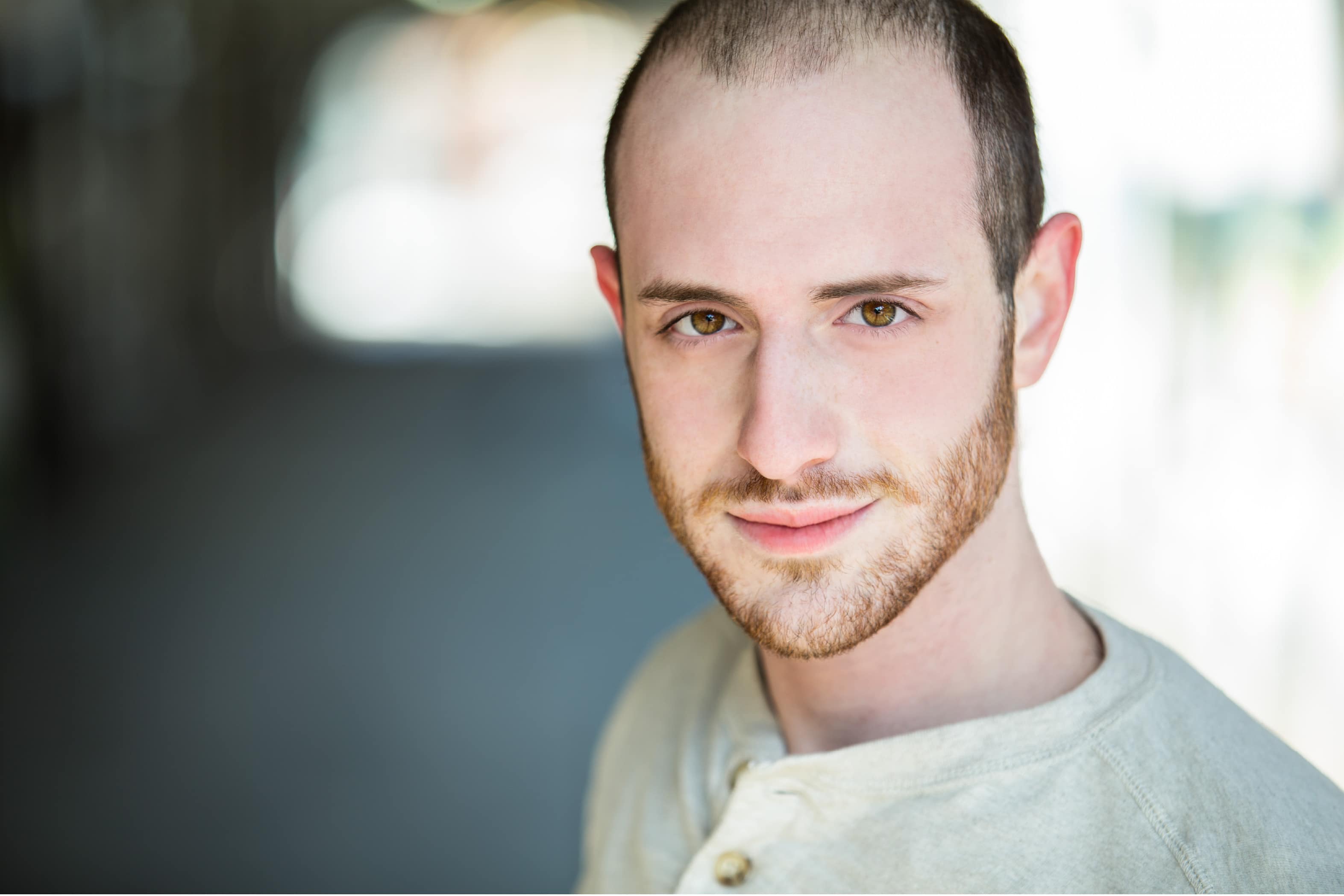
Josh is an actor with some serious musical chops who can, as he told me, “jump from plays to musicals pretty easily.” I had seen and written about Josh in the straight plays The Word and the Wasteland (Source Festival) and Bigger Than You, Bigger Than Me (Field Trip Theatre) and the musical code name: Cynthia (Pallas Theater). Josh also appeared recently in LIFE: A Comic Opera (Fringe Festival), Ragtime (Toby’s Dinner Theater), Floyd Collins (1st Stage), Dani Girl (Unexpected Stage), and James and the Giant Peach, which won a Helen Hayes for Best Ensemble (Adventure Theatre).
So I asked Josh for the inside scoop.
How did you get cast in Amazing Grace?
When the Museum of the Bible was opening up, they wanted to bring the Broadway production of Amazing Grace down to the museum, so they contacted Brad Watkins to assemble a cast of local talent. Brad is a local casting director who ran theatreWashington, and now he’s a freelance theater person. I was contacted by him back in April to audition, and I went in to meet the director of the Broadway production of Amazing Grace, Gabriel Barre, which was pretty daunting at the time. He turned out to be one of the most incredible people.
It would be a whole new production but with the same director?
Yes, the museum production is non-union, so they needed non-Equity actors from the area. Most of the actors are local, from places like Columbia, Annapolis, Baltimore.
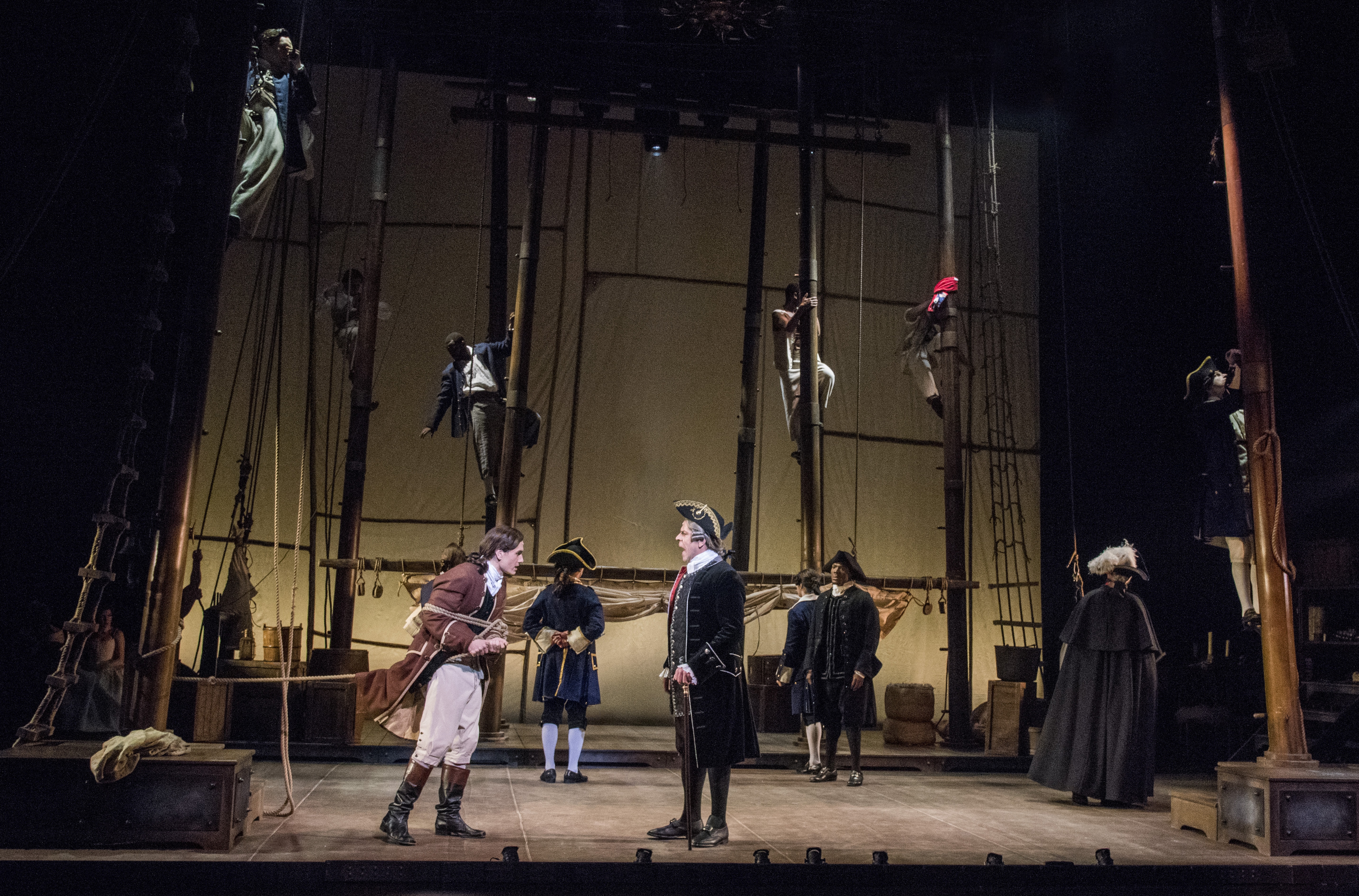
What’s it like working inside a new theater at this new museum?
We were told multiple times we are “christening” this theater. Not only are we seeing it for the first time but everybody is seeing it for the first time—the crew, the production team, the audience themselves. The Museum of the Bible was built from the ground up in a block of Southwest DC, and it houses millions of dollars worth of biblical artifacts from all over the world., as well as some technologically astounding exhibits—like the kind you find at a Smithsonian museum—all recounting the history of the Bible and how it was used historically. And I appreciate that the museum doesn’t shy away from saying: the Bible has been used to justify some wrongdoings as much as it’s been used to justify arts and philanthropy.
What is it like performing there? Take us backstage.
The theater was built with the idea that it was mostly for major conferences and concerts and not so much a full-scale Broadway musical. So the musical itself definitely had to be scaled down in order to accommodate the space—and I think we did a very good job of that. We don’t have a backstage area really. You leave the stage and you’re immediately in the back hallway of the building. It’s like an employee area—there are people running back and forth with chairs for the restaurant on the same floor, there are people doing security checks, and it’s also where we do our wardrobe and wig changes.
Speaking of wardrobe and wig changes, you play quite a few roles in Amazing Grace. Who are they?
I start out as a Ship Captain. I change into a Rabbi. I then go into a Navy Sailor. At some point, I’m also in the background as a Butler, and that’s just Act One. In Act Two I’m the Rabbi again in a different costume. I then play a Slave Ship Sailor. I’m then a Slave Owner in Barbados. And then I’m the Prince of England. So I play about eight characters in total, and I use about six costumes to play them.
And how many accents?
One German and about five different accents from various statuses and areas of England. At first, I would go off stage and have to take stock: okay, what character am I next? Luckily you have a costume crew right off stage who have the plot: you’re getting out of your Sailor costume and you’re getting dressed up as a Rabbi again.
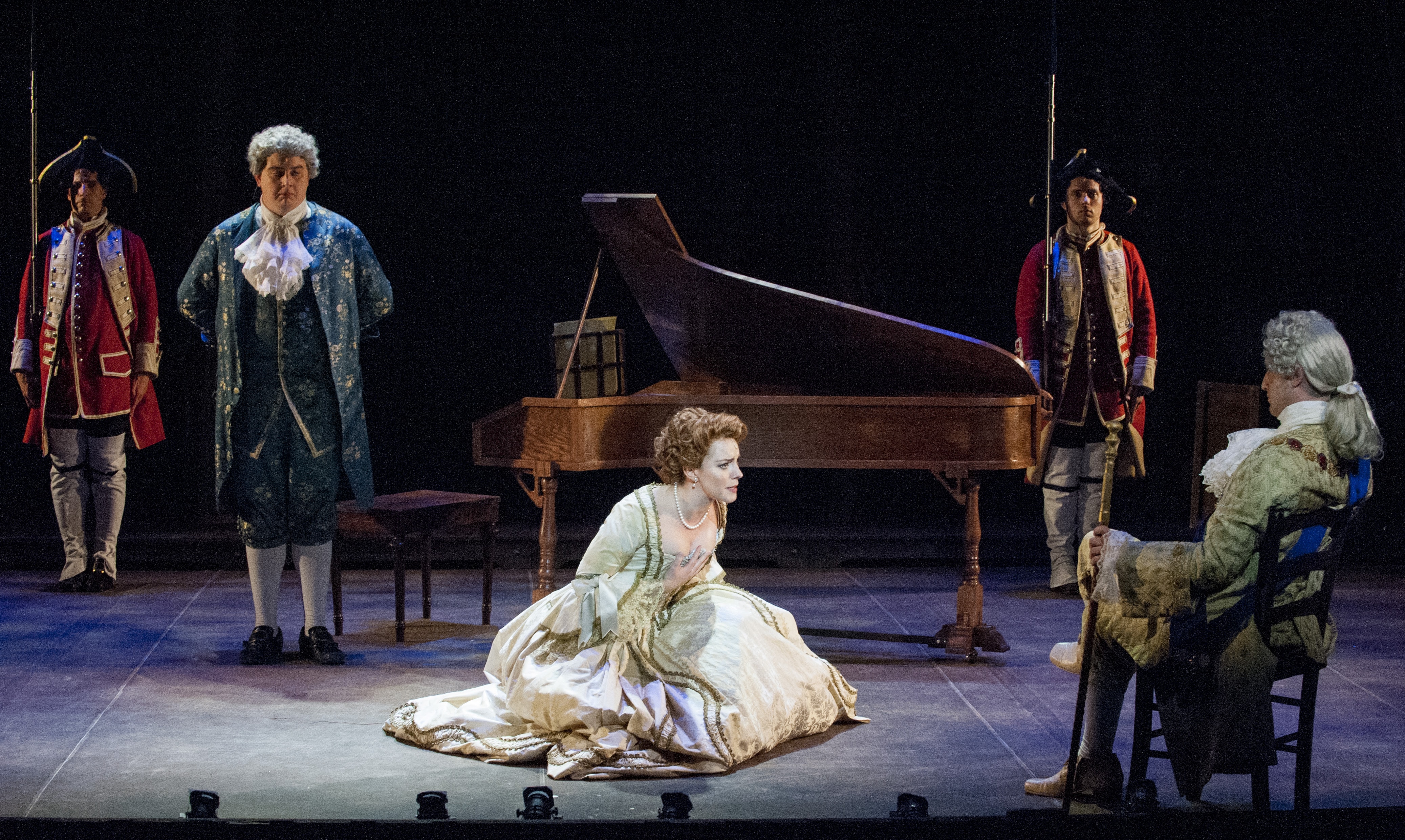
You play the Rabbi in that “We Are Determined” scene of Abolitionists, which was one of my favorites. What are your favorite moments?
I really do love coming out as the Prince of England—but who wouldn’t? I also really enjoy the Rabbi as a character because it represents how universal this idea of human decency and freedom for all is, how it transcends what your religious beliefs may be, what your background is—the idea that we are all equal and should be treated as such.
The cast is about evenly balanced black and white. And there are some really harsh scenes depicting slavery—the slave auction, slave capture. What was it like working that through with the company?
We would go into those scenes with our wonderful director taking us through very slowly and with the most respect for people’s feelings and well-being. The first thing he said was: we don’t want to shy away from telling this story and showing people what atrocities actually occurred when human beings were being sold as cargo. He said: we don’t want to deny or sugarcoat this for the audience. At the same time: we need to take care of each other. And so those difficult scenes were some of the most meticulously choreographed, detailed, and clearly-communicated-amongst-each-other scenes that we had to block. We just had to be there for each other and listen to each other, especially the brave, talented African American actors who were going to be showing this; we especially had to be aware of their well-being and do what they were comfortable with. It was always a conversation, but when you get on stage you have to tell that story; you don’t want to erase history.
One of the strengths of that musical is it’s so frank.
Yeah, or else you’re in danger of glossing over something that should never be glossed over.
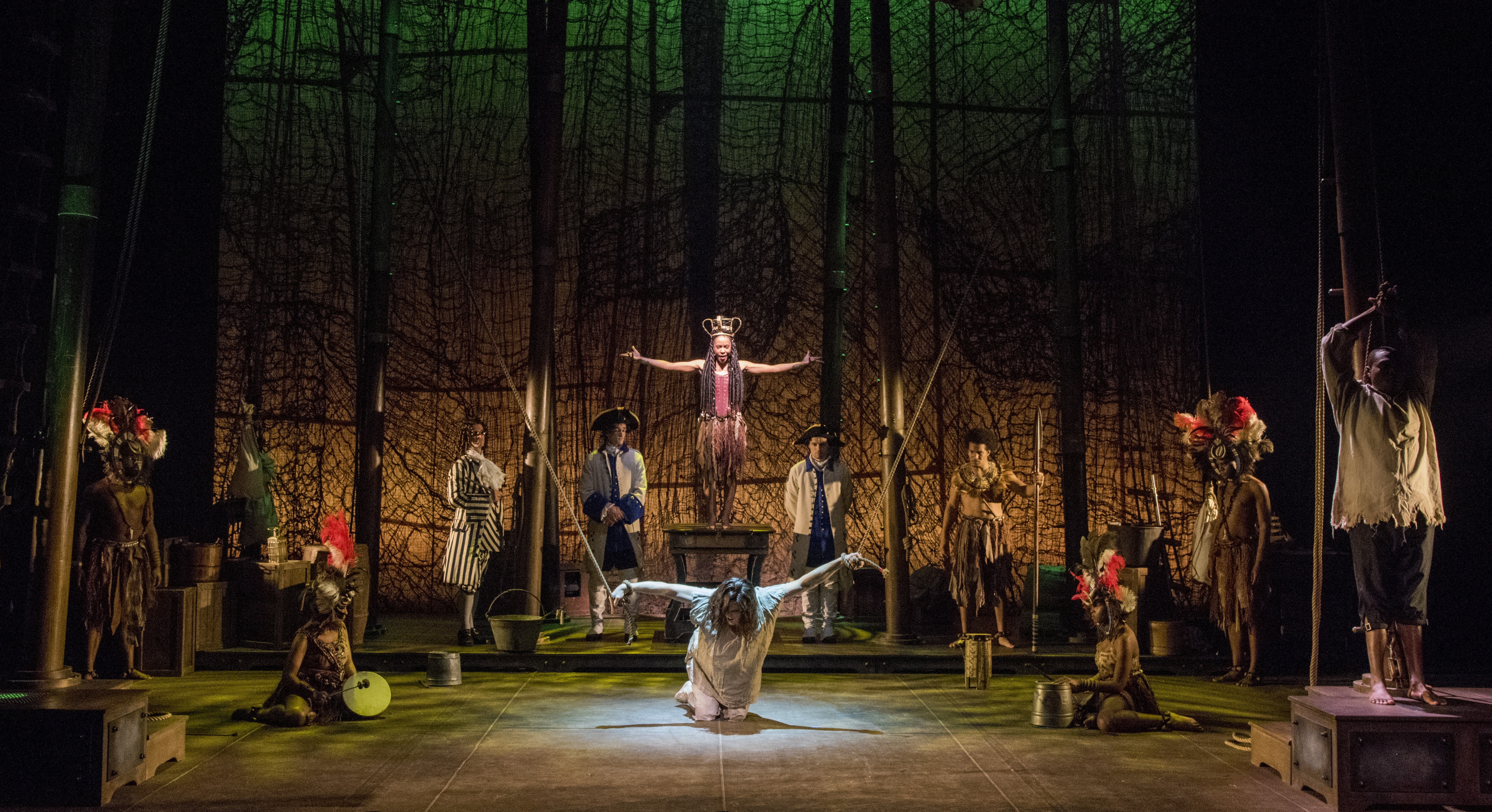
There has been some talk in town about the fact that the orchestrations are prerecorded. I thought they were lovely, and the dimensionality they brought to the score felt like being at a big movie theater.
The stage is small and has no pit. So the issue became: how are we going to create this soaring music without space for a full orchestra? We had an amazing team of music directors [Keith Levenson, Joseph Church, Matthew Pool] and orchestrators [Levenson and Josh Weesner] working day and night to craft the score. And it plays through a computer program that is run live from a small corner backstage where one of our music directors is able to control tempos. It’s an incredible technology to have, so we can tell this story in this space.
It felt very organic; I wasn’t aware that there was that much malleability in the playback.
The computer program is called Notion; and while the score that was arranged is permanent, the music director has the ability to speed things up, slow things down, hold out certain beats and vamps.
What’s it like to sing to a prerecorded track?
I’ve sung to recorded tracks before, and you have to follow the music. But this isn’t like that because we have somebody running the program, so it really does feel like a partnership between you and the music, as if the score were being played live. Our music director Keith is back there and we have monitors so that we can see him: while he’s running the program with one hand he conducts with the other.
It seemed to me that the organic emotionality of the performances had to come from someplace really connected. Will the recorded orchestrations go on the national tour?
Yeah, we start in New Haven a week after we close in DC January 7, and that one-man orchestra is coming with us.
I looked at the tour schedule. It’s a lot of one-night stops, and it ends in April in Texas. Have you ever been on a tour as—
—breakneck as this one? No. I’ve only ever been on one tour and it was to elementary schools in Virginia.
It’s going to be like every day is a travel day, every day is a performance day.
Thankfully we were told in no uncertain terms we will not be traveling overnight; we are always going to be staying still for at least one night and then traveling the next morning, which I’m really thankful for. I’d really not like to sleep on a bus every night.
How will they do load-out and load-in at such a pace, with that complex a set and lighting design?
The stage manager and crew will be loading out as soon as the show is done, then traveling to the next stop on a sleeper bus, and starting load-in all over in the morning. So they are going to be hard at work.
On the one hand it is breakneck, and on the other hand, it’s taking a show to lots of audiences that don’t normally get national tours of musicals.
We’re going to 27 states in all, and some places you’ve definitely heard of and some you probably would not be able to point out on a map if you tried.
What have audiences been like, and what’s your sense of what they have been taking away from the show?
The audiences have been unlike your usual musical audience because these are people who have come to the museum to learn about the history of their own religion or a major religious force in the world, and now they’re coming to see this show with some of the same thematic elements. They’re not people who are like: “Oh, Signature is doing a Gershwin musical, I love Gershwin.” These are people who have come to the museum and are now experiencing a live show as if it’s part of the museum experience. So they’ve been incredibly receptive and invested in this show, either because they weren’t expecting it to be so enthralling or because they already have that emotional connection to what the story is about.
Do you ever have any interaction with audience members after the show?
We do. Oftentimes we get people who are just so overwhelmed and so thankful that they were able to experience this. They came to the museum to read exhibits and see artifacts; they weren’t really expecting to be shown such a raw emotional story.
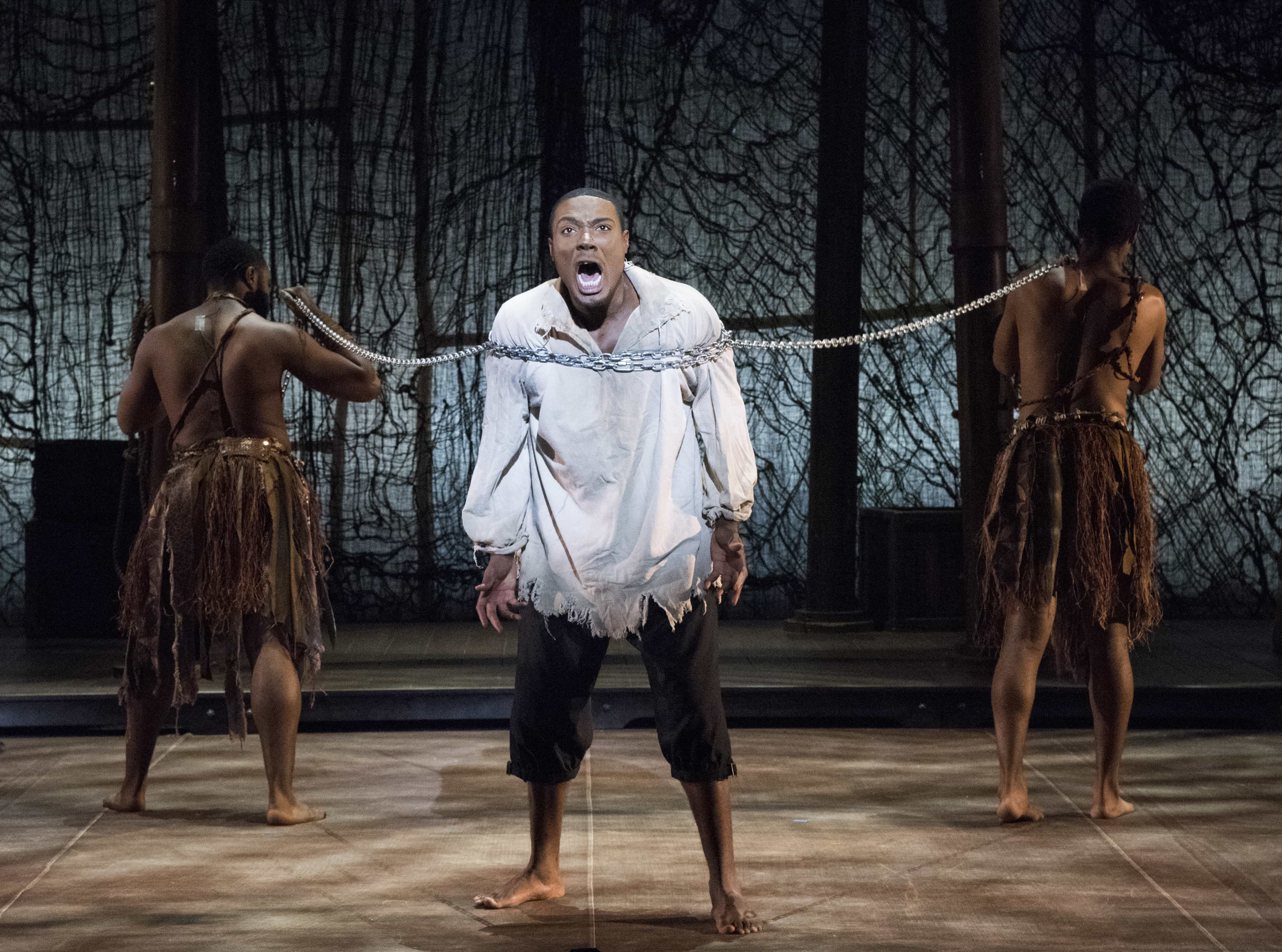
It must be very gratifying, not just for the professional opportunity this is for you as a performer but also to be involved in a project that’s connecting so deeply with audiences.
The audience response has been nothing short of amazing. People have had nothing but praise for the show. It’s been nothing but gratitude. And I feel encouraged every night to see audiences react in the way that they are reacting.
You’re out and you’re Jewish and you’re working on a show with a redemption theme that’s largely Christian, at a venue closely associated with conservative Evangelicals. What has that been like for you personally?
I’ll admit I had questions and concerns when I learned about the source of the museum itself and the story behind it. But to be honest, working with the people that I’ve gotten to work with, both on the production side of things and the artistic side, has been nothing short of amazing. I feel so honored to be working with these people—and telling a story that has elements of Christian redemption but also transcends that in its universal theme of becoming a better person. Working on this production, my questions and concerns kind of fell by the wayside while telling this story, and telling the story with such a diverse group of people—many of whom also have varied and unique backgrounds regarding religion, sexual orientation, where they come from, the experiences and hardships they had growing up. And simply being able to come together despite our differences and tell this story supersedes any concerns I may have had about being preached to.
I’ve sensed some suspicions in the DC theater community about this production of Amazing Grace—because of where it is playing, because it’s non-union, because there’s no orchestra pit.
There should always be a level of constructive support when people are trying to tell stories and create art and bring stories to people who might not otherwise get to experience them. I think a lot of times the authority of what is “good theater” forgets about that accessibility. They forget that there should be theater for everyone. Not every show is for everyone, but there should be a show for everyone. Everyone should have access to art and beautiful storytelling.
We had a mutual friend in Joel Markowitz, the founding editor of DC Theater Arts, who recently passed. And every time your name came up when he and I were talking, he spoke of you so highly and told me how he had followed your career. It was a connection that started when you were in a high school production and he named you a “performer of the year.”
I was lucky enough to see Joel while he was battling his illness in the last few months of his life, and I was lucky enough to be able to tell him that I credit him for starting my career in DC. He was such an avid supporter of the arts of all scales—not only going to Arena Stage and interviewing Estelle Parsons but also coming to a high school show and interviewing little Joshua Simon as he plays Lumère in Beauty and the Beast. It meant so much to me. As hokey as it sounds, I don’t think there is any way to repay or to thank Joel other than to just continue doing what I love to do—and never forgetting that he was one of the first people who said: you can do this.
Running Time: Just under three hours, including one intermission.
Amazing Grace plays through January 7, 2018, at the World Stage Theater in the Museum of the Bible, 400 4th Street SW, Washington DC. Tickets, which include admission to the museum two hours before showtime, can be purchased online.
LINK:
Review: ‘Amazing Grace’ at the Museum of the Bible by
VIDEO:





Yes is a wonderful article. I am looking forward to seeing it in Sarasota. So far I have not been able to find out what exact date it is and where it is playing. If you had any ideas or know where it will be in Sarasota what day and what place certainly would appreciate hearing from you. Thank you so much. Jean Simon